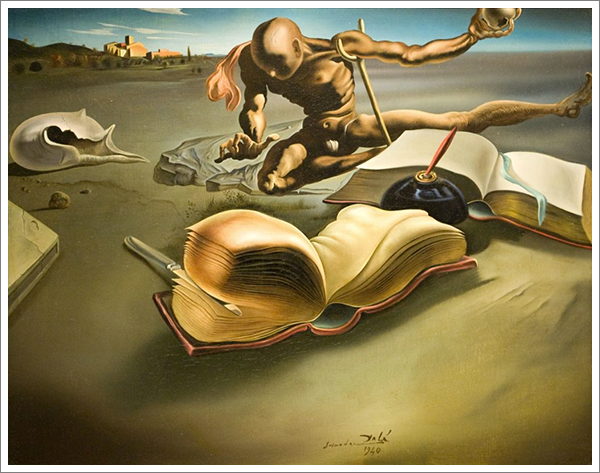•
the Blog
Journal clubs, ranked from worst to best
By Guillaume Filion, filed under
science,
journal club,
opinion.
• 07 March 2022 •
One of the most difficult tasks for an academic is to know the literature. Most labs run some kind of literature discussion, which are usually referred to as “journal clubs” in biology. We tested several variants when I created my lab in 2012 and we have learned a good deal about what works and what does not. So here is my personal view on the different types of journal clubs, from worst to best.
5. Online discussion forum
Live meetings have several disadvantages: they disrupt the workflow of experiments, there are no records, and some people speak too much. I reasoned that a good way of addressing all this would be to put up an online forum where we could upload a paper and share our thoughts. I invited all the ~300 researchers of the institute to participate with the plan to go to social media if it gained momentum.

That did not work at all. We never got past the first paper, which had only one comment (mine). It was not appealing at all to formalize your thoughts in order to write a paragraph and post it for people who work next door. The written form is...
The most important quality of a scientist
By Guillaume Filion, filed under
science,
management,
opinion.
• 15 September 2020 •
 When I established my lab and started to recruit people, I thought that it would be interesting to gather some information about what makes a good or a bad scientist. To this end, I designed a short questionnaire with eight questions. There was no right or wrong, nor even a preferred answer. Those were just questions to help me know the candidates better.
When I established my lab and started to recruit people, I thought that it would be interesting to gather some information about what makes a good or a bad scientist. To this end, I designed a short questionnaire with eight questions. There was no right or wrong, nor even a preferred answer. Those were just questions to help me know the candidates better.
The first question was “What is the most important quality of a scientist?” I had no particular expectation. Actually, I did not even know my own answer to this question. As it turned out, most candidates answered that it was either creativity or persistence.
If you have been in science for even a short while, you know why this makes sense. We have complicated problems to solve, so creativity and persistence are important. Yet, I was not convinced that a good scientist is someone who is either very creative or very persistent. The reason is that neither of these qualities defines a scientist. Artists, politicians, business people, social workers and pretty much everyone else greatly benefits from being creative or persistent.
Having spent more time with scientists, I came to find the answer to my...
Scientific models
By Guillaume Filion, filed under
science,
model,
dialogue.
• 01 January 2020 •
Literature discussions were usually very quiet in the laboratory, but somehow, this article had sparked a debate. Linda thought it was very bad. Albert liked it very much. Kate, the PI, was undecided. At some point the discussion stalled, so Kate made a move to wrap up.
“So, Linda, why do you think the article is bad?”
“Because they are missing a thousand controls.”
“OK. Albert, why do you like this article?”
“I find their model in figure 6 really cool. Actually, if it is true, it…”
“Precisely my point!” interrupted Linda. “It’s pure speculation!”
Kate intervened.
“Albert, you describe figure 6 as a model. What makes it a model?”
Albert spoke after a pause.
“It’s an idealized summary of their findings.”
“Fantasized you mean!” replied Linda.
Kate ignored the point and turned to Linda.
“Linda, do you think that figure 6 is a model?”
“Of course not! It’s just speculation.”
“Now I have a question for you Albert: what is the difference between a model and a summary?”
While Albert was thinking, Kate continued.
“And I also have a question for you Linda: what is the difference between speculation and assumption?”
Now they were...
On open peer review
By Guillaume Filion, filed under
science,
peer review,
opinion.
• 01 October 2018 •
Among the things that make science unique is the fact that scientists agree on what they say. There can be disagreement, but it is always understood as a temporary state, because either someone will be proven wrong, or new information will eventually reconcile everyone. Agreement is enforced in many ways, but pre-publication peer review is currently the dominant process, and it has been for over a century.
It is surprising that so little information is available about the efficiency of the peer review process. For instance, there is barely any justification as to why it is by default anonymous. Even more surprising is that people who express their opinion in this regard do not back it up with empirical evidence, because there is essentially no data. Let me clarify something: I do not have any data to show. But I have been signing my reviews for over seven years and I am happy to share this experience with those who wonder what happens when you do this.
How did it start?
I was first contacted by editors to review manuscripts at the time Stack Overflow eclipsed nearly all the forums on the Internet. The forums were supposed...
When scientific models fail
By Guillaume Filion, filed under
models,
science,
evolution.
• 13 April 2017 •
 Scientific models are more of an art than a science. It is much easier to recognize a good scientific model than to make one of our own. Like for an art, the best way to learn is to look at the work from the masters and take inspiration from them. One of the crown jewels of modern science is undoubtedly Darwin’s Theory of Evolution. I recently realized that I had no idea how Darwin stood against creationism and how he defended his view in regard of the doxa of his time. Digging into this topic turned out to be one the most important lessons I learned about the scientific method... and the lack of it.
Scientific models are more of an art than a science. It is much easier to recognize a good scientific model than to make one of our own. Like for an art, the best way to learn is to look at the work from the masters and take inspiration from them. One of the crown jewels of modern science is undoubtedly Darwin’s Theory of Evolution. I recently realized that I had no idea how Darwin stood against creationism and how he defended his view in regard of the doxa of his time. Digging into this topic turned out to be one the most important lessons I learned about the scientific method... and the lack of it.
Darwin touches vividly upon creationism at the end of “On the Origin of Species”. In his own words, he claims that
It is so easy to hide our ignorance under such expressions as the ‘plan of creation’, ‘unity of design’, etc, and to think that we give an explanation when we only restate a fact.
What strikes me here is that he does not accuse the ‘plan of creation’ and the ‘unity of design’ of not being proper scientific concepts. The real...

